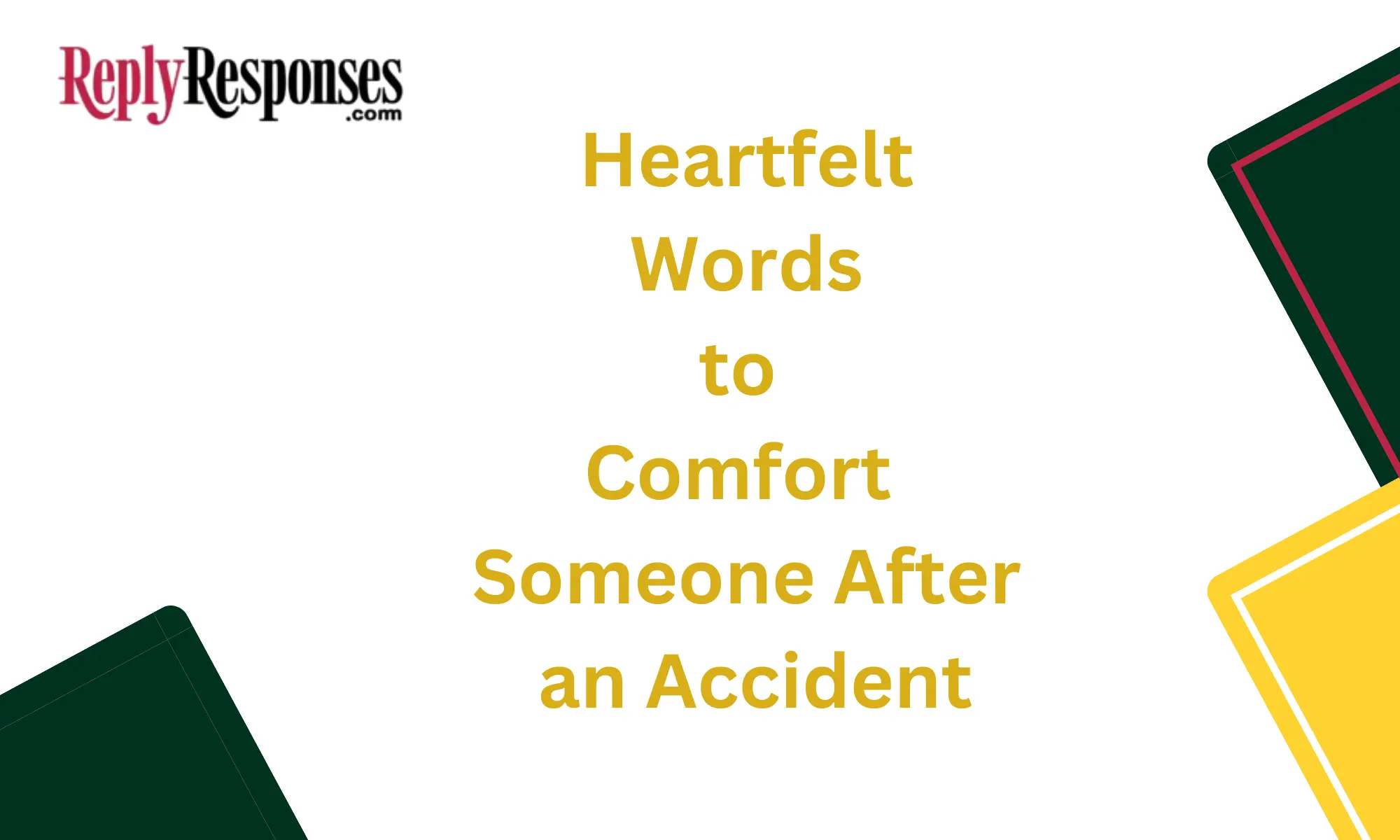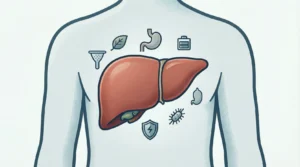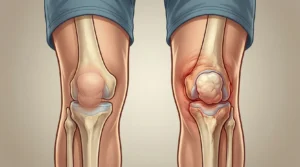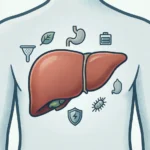Accidents can be a terrifying and traumatic experience, leaving people feeling shaken and vulnerable. In such moments, the right words can make all the difference in offering comfort and support. Whether they’re dealing with physical injuries, emotional shock, or both, your comforting words can be the beacon of hope they need to begin healing. This list of 40 heartfelt responses will help you provide reassurance, comfort, and a sense of safety to someone who has gone through an accident.
“Struggling to find the right words to comfort someone after an accident? Discover heartfelt messages to provide support and care during tough times.”
Below are 40 scenarios with thoughtful replies and their impacts, designed to show your empathy, care, and support in times of distress.
1. “Are you okay? I’m here for you!”
- Scenario: After hearing about the accident, you want to make sure the person feels your support.
- Impact: Simple but reassuring, this shows immediate care and willingness to be there for them.
2. “Take it easy, you’re going to get through this.”
- Scenario: When they’re feeling overwhelmed or anxious about their recovery.
- Impact: Calming and encouraging, this response lets them know it’s okay to take their time to heal.
3. “Accidents happen, but we’ll get through it together.”
- Scenario: After they express how scared they are or how things are uncertain.
- Impact: This reply reassures them that they’re not alone in their recovery process.
4. “I can’t imagine what you’re going through, but I’m here to listen if you need to talk.”
- Scenario: When they seem distant or unwilling to talk.
- Impact: Empathetic, giving them space while offering your full support.
5. “I’m so sorry this happened to you, but I know you’re strong enough to handle it.”
- Scenario: When they’re feeling defeated or vulnerable.
- Impact: Affirmative and uplifting, this boosts their confidence to face their situation.
6. “It might take some time, but you’ll heal, both physically and emotionally.”
- Scenario: They express doubts about their ability to recover.
- Impact: Encouraging, and reminding them that healing is a process.
7. “You’ve got this, one step at a time. Don’t rush your recovery.”
- Scenario: When they feel like they need to heal quickly or feel pressured.
- Impact: Reassuring, emphasizing the importance of patience during their recovery.
8. “I’m sending all my positive thoughts and love your way.”
- Scenario: When they’re feeling discouraged or unsure about their recovery.
- Impact: Loving and positive, offering emotional warmth and support.
9. “It’s okay to feel upset. I’m here to help you through this.”
- Scenario: When they show frustration or tears after the accident.
- Impact: Compassionate, normalizing their feelings and offering comfort.
10. “You’re not alone in this. We’ll get through this tough time together.”
- Scenario: When they feel isolated or afraid of facing their recovery alone.
- Impact: Supportive, reinforcing the idea that they have a solid support system.
11. “I’m just a call away if you need anything, even if it’s just to chat.”
- Scenario: When they express loneliness or a need for emotional support.
- Impact: Reassuring, giving them an open door for communication and reassurance.
12. “Your health is the most important thing right now, don’t worry about anything else.”
- Scenario: They may be concerned about responsibilities or other distractions.
- Impact: Comforting, reminding them that recovery is the priority.
13. “I know this is hard, but I believe in your strength to get through this.”
- Scenario: When they’re feeling down or questioning their ability to heal.
- Impact: Empowering, reminding them of their inner strength.
14. “Accidents don’t define you. You’re still amazing, and I’m here to help you heal.”
- Scenario: When they feel embarrassed or defeated by the accident.
- Impact: Affirming, helping them separate the accident from their identity.
15. “Don’t worry about anything else right now, just focus on healing. I’m here for everything else.”
- Scenario: When they’re feeling overwhelmed by everything going on after the accident.
- Impact: Supportive, offering peace of mind so they can focus on recovery.
16. “You’re stronger than you think, and I’ll be with you every step of the way.”
- Scenario: When they express doubts or fear about the road to recovery.
- Impact: Reassuring, reminding them of their strength and your unwavering support.
17. “It’s going to take time, but you’re already on your way to feeling better.”
- Scenario: They are impatient or feeling like recovery is taking too long.
- Impact: Realistic, setting proper expectations while encouraging progress.
18. “I’m so glad you’re okay. Everything else can be fixed, but your health comes first.”
- Scenario: When they express concern about things like car damage or financial stress.
- Impact: Comforting, reinforcing the idea that their health is the priority.
19. “I’m here to take care of you, just tell me what you need.”
- Scenario: When they feel helpless or need assistance after the accident.
- Impact: Offering practical help while emphasizing your support.
20. “You’re going to get through this, and I’ll be here for the long haul.”
- Scenario: When they’re feeling discouraged and overwhelmed by their situation.
- Impact: Long-term reassurance, letting them know you’ll stick by their side.
21. “I’m so glad you’re okay, accidents can be so scary. Let’s take things slow and focus on getting you better.”
- Scenario: When they express fear or trauma from the accident.
- Impact: Reassuring and calming, promoting a slower, more comfortable recovery pace.
22. “I know this feels like a lot right now, but you’re not alone. We’re in this together.”
- Scenario: When they feel overwhelmed by the process of healing.
- Impact: Comforting, assuring them that they have a strong support network.
23. “It’s okay to take things easy. No need to rush back to normal life just yet.”
- Scenario: When they’re feeling pressure to get back to their routine.
- Impact: Helpful, encouraging them to slow down and prioritize self-care.
24. “Rest up and let your body heal. Everything else can wait.”
- Scenario: When they’re feeling guilty about taking time off to recover.
- Impact: Reassuring, and helping them understand that rest is key to healing.
25. “You’re a fighter, and I have no doubt you’ll come out stronger from this.”
- Scenario: When they’re feeling weak or worried about their recovery.
- Impact: Empowering, building confidence in their ability to bounce back.
26. “This may be tough right now, but remember that you’re stronger than any accident.”
- Scenario: When they express doubt about their strength during recovery.
- Impact: Motivating, reminding them of their resilience.
27. “I’m proud of you for staying strong through this. You’ve got this!”
- Scenario: When they seem discouraged or frustrated.
- Impact: Uplifting and supportive, boosting their morale.
28. “I know it’s hard, but I’m always here to help however I can.”
- Scenario: When they’re feeling like they’re on their own.
- Impact: Comforting, emphasizing that they don’t have to face this alone.
29. “You’ve been through a lot, and I admire your strength. Take your time to heal.”
- Scenario: When they feel exhausted or overwhelmed by the aftermath.
- Impact: Acknowledging their hardship and encouraging rest.
30. “I’m so sorry you’re going through this, but I know you’ll recover quickly.”
- Scenario: When they feel defeated or like their recovery will take too long.
- Impact: Optimistic, helping them look toward a bright recovery.
31. “It’s okay to take breaks. Healing isn’t a race, and I’m here to help whenever you need.”
- Scenario: When they feel pressure to get better quickly.
- Impact: Encouraging rest and patience during recovery.
32. “I’m here to help however I can. Don’t hesitate to ask for anything!”
- Scenario: When they feel embarrassed about asking for help.
- Impact: Offering unconditional support, making them feel comfortable reaching out.
33. “Accidents happen, but we’ll work together to get through this. You’re not alone.”
- Scenario: When they feel isolated or discouraged by their accident.
- Impact: Reassuring, emphasizing the importance of teamwork in recovery.
34. “I know it’s been tough, but I’m so proud of how you’re handling everything.”
- Scenario: When they seem to be handling things well but still feel anxious.
- Impact: Reassuring and motivating, boosting their confidence in their recovery.
35. “You’ve been through a lot, but I know you’ll be back on your feet in no time.”
- Scenario: When they feel like the accident is too much to handle.
- Impact: Positive and hopeful, helping them feel optimistic about their future recovery.
36. “I can’t imagine how you’re feeling right now, but I’m here for you through it all.”
- Scenario: When they feel like no one understands what they’re going through.
- Impact: Compassionate and empathetic, validating their emotions.
37. “Take things slowly, rest up, and know that you’ll be back to your old self before you know it.”
- Scenario: When they feel the need to recover quickly but are facing setbacks.
- Impact: Encouraging a relaxed pace, reassuring them that progress will come with time.
38. “You’re in my thoughts, and I know you’ll come back even stronger from this.”
- Scenario: When they feel low about their recovery progress.
- Impact: Hopeful, boosting their confidence and morale.
39. “Accidents happen to the best of us. You’ll heal, and I’ll be here to help you every step of the way.”
- Scenario: When they feel like the accident defines them.
- Impact: Normalizing the experience and showing unwavering support.
40. “Just remember: This too shall pass. You’ll be back to your old self in no time!”
- Scenario: When they seem anxious about the future.
- Impact: Reassuring, letting them know that healing is temporary and progress will come.
FAQs
What should I say to comfort someone after an accident?
- Simple and caring phrases to show support.
How can I express sympathy without sounding awkward?
- Tips for delivering heartfelt messages with sincerity.
What are some examples of encouraging words after an accident?
- Uplifting phrases to inspire hope and recovery.
How do I check on someone’s well-being after an accident?
- Thoughtful ways to ask about their condition.
What can I say to help someone stay positive during recovery?
- Supportive words to boost morale.
Should I avoid certain phrases when comforting someone?
- Words or topics to steer clear of in sensitive situations.
How can I comfort someone through text messages?
- Examples of meaningful texts to show you care.
What are some thoughtful ways to offer help after an accident?
- Suggestions for providing practical and emotional support.
How do I handle the conversation if they seem upset or emotional?
- Approaches to remain compassionate and understanding.
What’s the best way to follow up with someone after an accident?
- Tips for maintaining consistent support during their recovery.

John Michael is the creative mind behind replyresponses.com, sharing witty, smart, and relatable responses for every situation — helping people text confidently, laugh often, and connect better every day.












